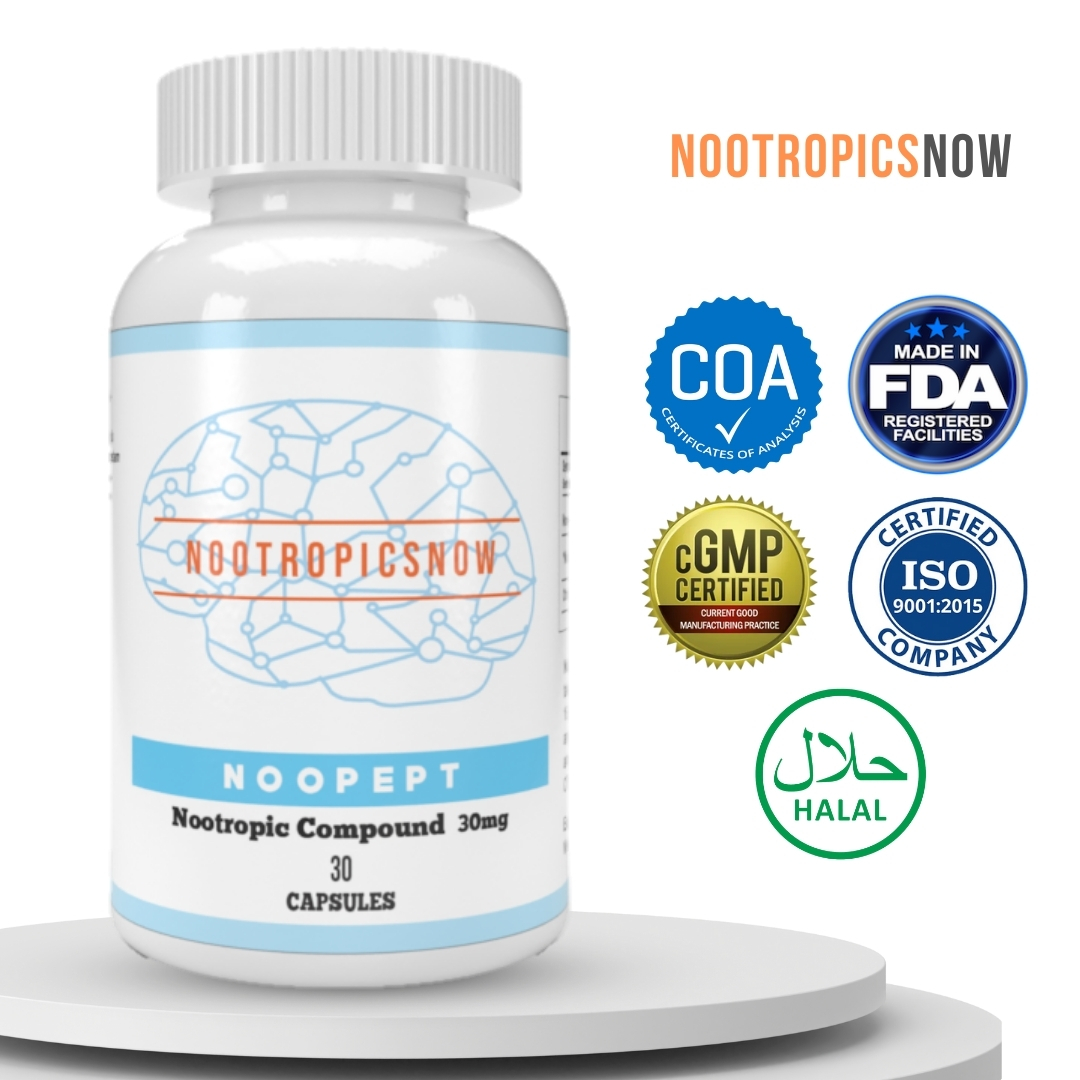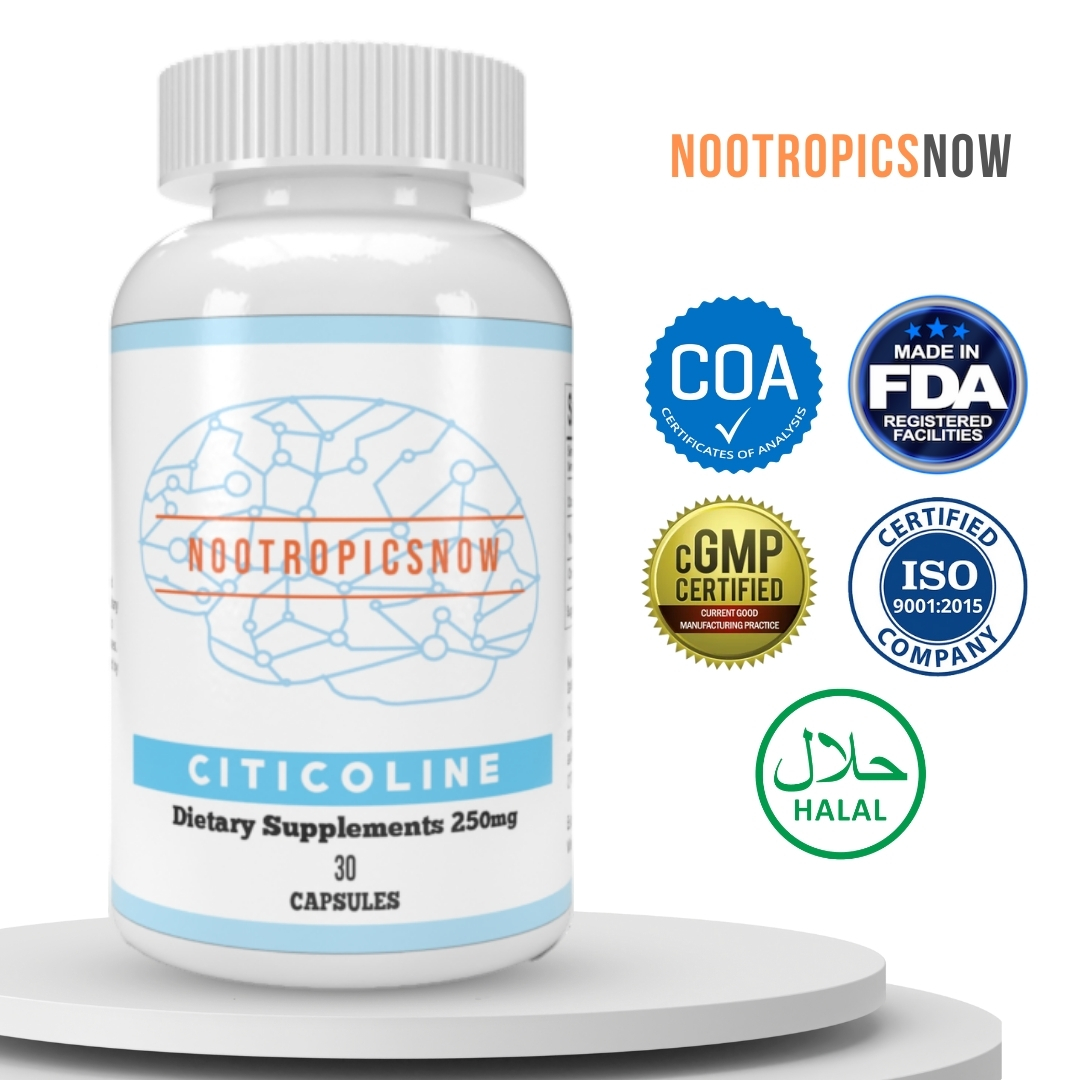Noopept & Choline: Benefits & Dosage

Noopept and Choline: A Synergistic Stack for Cognitive Enhancement
Noopept and choline represent a powerful combination in the realm of nootropics. Individually, they offer distinct cognitive benefits. However, when combined, they synergize to amplify these effects, providing comprehensive cognitive enhancement. This section explores the benefits, mechanisms of action, optimal dosages, and potential side effects of using Noopept and choline together. Furthermore, it delves into user experiences and considerations for maximizing the effectiveness of this stack.
Understanding Noopept

Noopept, chemically known as N-phenylacetyl-L-prolylglycine ethyl ester, is a synthetic nootropic molecule belonging to the racetam family. However, it is structurally distinct from other racetams like piracetam or aniracetam. Often considered a “smart drug,” Noopept enhances various cognitive functions, including memory, focus, and learning ability.
Mechanisms of Action of Noopept
Noopept’s cognitive-enhancing effects stem from several key mechanisms:
Increased NGF and BDNF Levels: Noopept significantly increases the expression of Nerve Growth Factor (NGF) and Brain-Derived Neurotrophic Factor (BDNF). These neurotrophins play crucial roles in neuronal growth, survival, and plasticity, fostering a conducive environment for learning and memory consolidation. This, consequently, may boost overall cognition.
Modulation of Acetylcholine: Acetylcholine is a crucial neurotransmitter involved in memory, learning, and attention. Noopept potentiates cholinergic neurotransmission, enhancing acetylcholine release and receptor sensitivity, thereby improving cognitive performance. Moreover, this enhances nerve communication within the brain.
Glutamate Receptor Modulation: Noopept modulates glutamate receptor activity. Glutamate is the primary excitatory neurotransmitter in the brain, essential for synaptic plasticity and learning. Noopept helps optimize glutamate transmission, promoting healthy cognitive function. Therefore, this aids in a balanced excitatory environment in the brain.
Antioxidant and Neuroprotective Properties: Noopept exhibits antioxidant properties. It helps protect brain cells from oxidative stress and damage caused by free radicals. In turn, this contributes to long-term brain health and cognitive resilience. Additionally, it may assist in preventing cognitive decline.
Understanding Choline
Choline is an essential nutrient, often classified as a B-vitamin, crucial for various physiological processes, including brain health. It serves as a precursor to acetylcholine, a neurotransmitter indispensable for memory, muscle control, and mood. Furthermore, choline supports cell structure and function.
Forms of Choline
Several forms of choline are available as supplements, each with varying degrees of bioavailability and efficacy:
Choline Bitartrate: A common and inexpensive form of choline. However, it may be less efficient at crossing the blood-brain barrier. As a result, this may reduce its impact on brain function.
Choline Chloride: Similar to choline bitartrate in terms of bioavailability.
CDP-Choline (Citicoline): A more bioavailable form of choline that readily crosses the blood-brain barrier. It also provides cytidine, which is converted into uridine, another nootropic compound. It is often preferred for nootropic stacks.
Alpha-GPC (Alpha-Glycerylphosphorylcholine): Another highly bioavailable form of choline that quickly converts into acetylcholine in the brain. It is often favored for its rapid effects and cognitive enhancement potential. Moreover, it’s known for efficiently raising choline levels.

View Product
Why Choline is Important When Taking Noopept
While Noopept enhances acetylcholine activity, it does not directly increase choline availability. Using Noopept can deplete choline reserves, potentially leading to headaches or cognitive fatigue. Supplementing with choline ensures that the brain has ample raw materials to synthesize acetylcholine, maximizing Noopept’s cognitive benefits. Without sufficient choline, Noopept’s efficacy might be limited. Supplementing choline helps maintain the balance.
Synergistic Benefits of Noopept and Choline
Combining Noopept and choline creates a powerful synergistic effect that amplifies their individual benefits:
Enhanced Memory and Learning: Noopept boosts neurotrophic factors and modulates glutamate transmission, whereas choline ensures adequate acetylcholine production. This combination optimizes the neurochemical environment for memory formation and learning. Therefore, this facilitates improved cognitive processing.
Improved Focus and Concentration: Both Noopept and choline contribute to improved focus and attention span. Noopept modulates neurotransmitter release. Also, it increases BDNF levels, while choline supports acetylcholine synthesis, leading to sharper focus and mental clarity. Thus, users can experience sustained attention.
Reduced “Brain Fog”: Some users experience “brain fog” or cognitive fatigue with Noopept alone, which may indicate choline deficiency. Supplementing with choline can alleviate these symptoms, leading to a clearer and more focused mental state. Moreover, it promotes mental sharpness.
Mitigation of Side Effects: Choline can mitigate some of the potential side effects associated with Noopept, such as headaches, irritability, and insomnia. These side effects often arise from acetylcholine depletion, which choline supplementation can prevent. It effectively offsets any imbalances that may arise.
Optimal Dosages for Noopept and Choline
Finding the optimal dosage for Noopept and choline depends on individual factors such as body weight, sensitivity, and desired effects. However, general guidelines can help you get started:
Noopept Dosage: The typical dosage range for Noopept is 10-30 mg per day, divided into multiple doses. It is advisable to start with a lower dose (10 mg) and gradually increase it as needed. Some users find that sublingual administration (placing the powder under the tongue) enhances absorption and bioavailability. It’s vital to titrate the dosage carefully.

View Product
Choline Dosage: The optimal choline dosage varies depending on the form used:
Alpha-GPC: 300-600 mg per day, divided into one or two doses.
CDP-Choline (Citicoline): 500-1000 mg per day, divided into one or two doses.

View Product
Choline Bitartrate: Higher doses are generally required due to lower bioavailability, typically ranging from 1000-3000 mg per day. However, this form may be less effective for nootropic purposes.
Ratio of Noopept to Choline: A common recommendation is to use a ratio of approximately 1:20 to 1:30 between Noopept and the choline source (Alpha-GPC or CDP-Choline). For example, if you are taking 10 mg of Noopept, you might consider taking 200-300 mg of Alpha-GPC. This helps maintain a balance.
Potential Side Effects and Precautions
While Noopept and choline are generally considered safe, some individuals may experience side effects:
Noopept Side Effects: Common side effects include headaches, irritability, anxiety, insomnia, and gastrointestinal discomfort. These side effects are often mild and transient.
Choline Side Effects: High doses of choline can cause side effects such as fishy body odor, nausea, diarrhea, and low blood pressure. Starting with a lower dose can help minimize these effects.
Interactions: Consult with a healthcare professional before using Noopept and choline, especially if you have any pre-existing medical conditions or are taking other medications. Noopept may interact with anticoagulants and antiplatelet drugs.
Precautions
Start Low and Go Slow: Begin with the lowest recommended doses and gradually increase them, monitoring your body’s response.
Cycle On and Off: Consider cycling Noopept and choline to prevent tolerance and maintain their effectiveness. A common cycle is 2-3 weeks on, followed by 1-2 weeks off.
Monitor Cognitive Effects: Pay attention to how Noopept and choline affect your cognitive functions, mood, and overall well-being. Adjust the dosages accordingly.
Stay Hydrated: Drink plenty of water to support optimal brain function and minimize potential side effects.
Get Adequate Sleep: Prioritize sleep to maximize the cognitive benefits of Noopept and choline.
User Experiences and Anecdotes
Many users report significant cognitive enhancements from combining Noopept and choline. Common experiences include:
Improved Memory Recall: Users often find that they can recall information more easily and remember details with greater accuracy.
Increased Focus and Concentration: Many report enhanced focus and attention span, making it easier to concentrate on tasks for extended periods.
Enhanced Learning Ability: Users have reported faster learning and improved comprehension of new information.
Positive Mood: Some users experience an elevation in mood and a greater sense of well-being.
However, individual responses can vary. Some users may experience little to no noticeable effects, while others may be more sensitive to the side effects. Factors such as genetics, lifestyle, and pre-existing conditions can influence the outcome.
Considerations for Maximizing Effectiveness
To maximize the effectiveness of the Noopept and choline stack, consider the following:
Quality of Supplements: Choose high-quality supplements from reputable brands. Look for products that are third-party tested for purity and potency.
Lifestyle Factors: Optimize your lifestyle by getting adequate sleep, eating a healthy diet, exercising regularly, and managing stress. These factors can significantly impact cognitive function.
Stacking with Other Nootropics: While Noopept and choline can be a powerful stack on their own, some users experiment with combining them with other nootropics, such as piracetam, aniracetam, or racetams, for even greater cognitive enhancement. However, proceed with caution and start with low doses to avoid potential interactions.

View Product
Individual Variability: Remember that everyone responds differently to nootropics. What works for one person may not work for another. Experiment with different dosages and combinations to find what works best for you.
Long-Term Use: The long-term effects of Noopept and choline are still being studied. It is essential to use these supplements responsibly and consult with a healthcare professional, especially if you plan to use them long-term.
Integrating Noopept and Choline Into Your Routine
Adding Noopept and choline to your daily routine necessitates a well-thought-out strategy. First, establish a baseline cognitive function. Take note of your typical levels of focus, memory recall, and mental clarity prior to beginning the stack. This baseline will serve as a point of comparison. Second, it’s critical to establish clear goals for cognitive improvement. Are you aiming to boost memory retention for studies, or heighten focus for work tasks? Keeping clear goals in mind can help measure the stack’s effectiveness.
Third, it is important to start with minimum dosages. For Noopept, a starting dose of 10mg daily will allow assessment of how your body reacts. Then, introduce choline, either Alpha-GPC or CDP-Choline, at recommended lower dosages. Fourth, carefully monitor your cognitive responses. Keep a journal to record subjective feelings. Include aspects such as enhanced attention, memory improvements, or mood changes. Also, monitor for side effects like headaches. In this way, you can adapt future intake, and establish long-term habits.
Noopept and Choline Stack: A Closer Look at Potential Synergies
The potency of combining Noopept and Choline is rooted in their distinctive yet harmonious effects on brain chemistry. Noopept stimulates neurotrophic factors (BDNF and NGF), crucial for neuronal growth and resilience. However, to optimize their action, the brain needs sufficient neurotransmitter building blocks. That’s where choline enters the equation.
When Noopept ramps up the demand for acetylcholine, choline provides the brain with necessary material for synthesis. This partnership not only optimizes the immediate effects of both substances but also nurtures lasting brain health by supporting neuronal plasticity. In addition, choline’s provision of precursors like acetyl-CoA also strengthens the overall efficacy of Noopept in improving both short and long-term cognitive functions.
Noopept-Choline vs. Other Nootropic Stacks
Comparing Noopept and Choline stacks with other widely recognized nootropic combinations offers valuable insights. Consider the Caffeine and L-Theanine stack. While caffeine may quickly boost alertness and focus, it can lead to jitteriness and crashes for some individuals. The addition of L-Theanine counteracts these effects, by providing relaxation without drowsiness. However, Noopept and Choline go a step further by providing long-term cognitive support by influencing neuroplasticity, memory consolidation, and acetylcholine synthesis.
Conclusion
Noopept and choline represent a potent synergistic stack for cognitive enhancement. This combination addresses multiple aspects of cognitive function, including memory, focus, learning, and overall brain health. By understanding the mechanisms of action, optimal dosages, potential side effects, and user experiences, you can make informed decisions about incorporating this stack into your routine. This, of course, is always done in consultation with your physician. Remember to start low, go slow, monitor your body’s response, and prioritize lifestyle factors to maximize the benefits and minimize the risks.
Noopept and Choline: Maximizing Cognitive Potential
Nootropics continue to gain popularity, and among them, Noopept stands out as a potent cognitive enhancer. However, to truly unlock Noopept’s potential, combining it with choline is often recommended. This section dives deep into the synergy between Noopept and choline, exploring their individual mechanisms, combined benefits, optimal dosages, and important considerations for safe and effective use.
Understanding Noopept: A Detailed Overview
Noopept, also known as N-phenylacetyl-L-prolylglycine ethyl ester, is a synthetic nootropic molecule. Initially developed in Russia, it is prized for its potential cognitive-enhancing and neuroprotective effects. While structurally similar to piracetam, a well-known racetam nootropic, Noopept is purported to be significantly more potent, with some estimates suggesting it to be up to 1,000 times stronger on a milligram-per-milligram basis. This means smaller doses can potentially yield significant cognitive improvements.

View Product
Mechanisms of Action
Noopept’s effects are attributed to several key mechanisms:
Increased BDNF (Brain-Derived Neurotrophic Factor) and NGF (Nerve Growth Factor) levels: BDNF and NGF are crucial proteins that support the survival, growth, and differentiation of neurons. Increasing their levels can promote neuroplasticity, the brain’s ability to adapt and form new connections, which is essential for learning and memory. Therefore, Noopept fosters a brain environment conducive to cognitive enhancement.
Enhanced Acetylcholine Activity: Acetylcholine is a critical neurotransmitter involved in various cognitive processes, including memory, learning, and attention. Noopept is believed to increase acetylcholine levels by influencing acetylcholine receptors and potentially by inhibiting the breakdown of acetylcholine.
Glutamate Receptor Modulation: While glutamate is an excitatory neurotransmitter vital for brain function, excessive glutamate activity can lead to excitotoxicity, damaging neurons. Noopept appears to have a modulatory effect on glutamate receptors, potentially protecting against excitotoxicity and supporting neuronal health. This contributes to Noopept’s neuroprotective properties.
Antioxidant Properties: Noopept exhibits antioxidant activity, helping to protect brain cells from damage caused by free radicals. Free radicals contribute to oxidative stress, which is implicated in aging and neurodegenerative diseases.
Cognitive Benefits of Noopept
Users of Noopept often report experiencing a range of cognitive benefits, including:
Improved Memory: Noopept is particularly noted for its potential to enhance both short-term and long-term memory. Users may find it easier to recall information and learn new skills.
Enhanced Learning Ability: The increase in neuroplasticity and improved neuronal communication can facilitate faster and more efficient learning.
Increased Focus and Attention: Many users report experiencing improved concentration and the ability to sustain attention for longer periods.
Improved Cognitive Processing Speed: Noopept may help speed up cognitive processing, allowing users to think more quickly and efficiently.
Reduced Anxiety: Some users have reported experiencing a reduction in anxiety and improved mood. This effect may be related to Noopept’s influence on neurotransmitter systems.
Noopept Dosage
The typical dosage range for Noopept is 10-30 mg per day, divided into two or three doses. It’s crucial to start with a low dose (e.g., 10 mg twice daily) to assess your individual response and minimize the risk of side effects. Some experienced users may increase the dosage gradually, but it’s always recommended to stay within the stated range. The effects of Noopept can be felt within 30-60 minutes, with the peak effects lasting for several hours.
Understanding Choline: The Acetylcholine Precursor
Choline is an essential nutrient crucial for various bodily functions, most notably brain health and cognitive function. It’s a precursor to acetylcholine, meaning the body uses choline to produce this vital neurotransmitter. Ensuring adequate choline intake is essential for optimal cognitive performance.
Dietary Sources of Choline
Choline is naturally found in several food sources, including:
Egg yolks: One of the richest sources of choline.
Liver: A good source, although consumption should be moderate due to its high cholesterol content.
Beef: Contains a decent amount of choline.
Soybeans: A plant-based source of choline.
Broccoli and cauliflower: These vegetables offer smaller amounts of choline.
However, many individuals may not obtain sufficient choline through diet alone, leading to potential cognitive deficits. Supplementing with choline can help bridge this gap.
Types of Choline Supplements
Several choline supplements are available, each with varying bioavailability and effects. The most common types include:
Choline Bitartrate: A relatively inexpensive form of choline but with lower bioavailability compared to other options.
CDP-Choline (Citicoline): A more bioavailable form of choline that also provides cytidine, which can be converted into uridine, another important brain nutrient.

View Product
Alpha-GPC (Alpha-Glycerylphosphorylcholine): Another highly bioavailable form of choline that readily crosses the blood-brain barrier. Alpha-GPC is considered one of the best choline sources for nootropic purposes.

View Product
Phosphatidylcholine: A component of lecithin, this form of choline is found in soy and sunflower lecithin supplements.
Choline’s Role in Cognitive Health
Choline plays a vital role in several cognitive processes, including:
Acetylcholine Synthesis: As mentioned earlier, choline is a direct precursor to acetylcholine, essential for memory, learning, and attention.
Cell Membrane Structure: Choline is a component of phospholipids, which are crucial for the structure and function of cell membranes, including those in the brain.
Nerve Signaling: Choline contributes to proper nerve signaling and communication within the brain.
Choline Deficiency
A choline deficiency can lead to various health issues, including:
Cognitive Impairment: Deficiencies can impair memory, learning, and attention.
Liver Problems: Choline is essential for liver function. Deficiencies can lead to non-alcoholic fatty liver disease.
Muscle Damage: Choline plays a role in muscle function.
The Synergy of Noopept and Choline: A Powerful Combination
Combining Noopept with a choline source is a common practice among nootropic users. The rationale behind this combination lies in the fact that Noopept enhances acetylcholine activity, and choline provides the building blocks for acetylcholine synthesis. This creates a synergistic effect, maximizing the cognitive benefits of both substances.
Addressing Potential Choline Depletion
One of the primary reasons for stacking Noopept with choline is to prevent potential choline depletion. When Noopept increases acetylcholine activity, it can lead to increased acetylcholine turnover. If the body doesn’t have enough choline available, it can lead to a choline deficiency, resulting in side effects like headaches, brain fog, and fatigue. Supplementing with choline ensures that the brain has sufficient resources to produce acetylcholine, preventing these side effects.
Enhanced Cognitive Benefits
Beyond preventing choline depletion, the combination of Noopept and choline can also enhance cognitive benefits. By providing the necessary building blocks, choline optimizes the effects of Noopept, leading to:
Greater Memory Improvement: The enhanced acetylcholine activity contributes to more significant improvements in both short-term and long-term memory.
Improved Focus and Concentration: The combination promotes a more sustained and focused mental state.
Enhanced Learning Capacity: The increased neuroplasticity and improved neuronal communication facilitate faster and more efficient learning.
Neuroprotection: Choline also has neuroprotective properties, further complementing Noopept’s neuroprotective effects.
Choosing the Right Choline Source
Selecting the appropriate choline source is essential for maximizing the benefits of this stack. Alpha-GPC and CDP-Choline are generally considered the best options due to their high bioavailability and ability to readily cross the blood-brain barrier. These forms of choline are more effective at raising acetylcholine levels in the brain compared to choline bitartrate.
Dosage and Ratios
The optimal dosage of choline will vary depending on the individual and the specific choline source used. As a general guideline:
Alpha-GPC: 300-600 mg per day.
CDP-Choline: 500-1000 mg per day.
These dosages are typically taken alongside Noopept, divided into two or three doses throughout the day. It’s important to experiment to find the dosage that works best for you. Some users may find that they need more or less choline depending on their individual needs and dietary intake.
Potential Side Effects and Precautions
While generally well-tolerated, both Noopept and choline can cause side effects in some individuals. It’s essential to be aware of these potential side effects and take appropriate precautions.
Noopept Side Effects
Common side effects of Noopept include:
Headaches: Often caused by choline depletion. Supplementing with choline can often alleviate this side effect.
Irritability: Some users report experiencing increased irritability or anxiety. Reducing the dosage may help.
Insomnia: Taking Noopept too late in the day can interfere with sleep. It’s best to take it in the morning or early afternoon.
Brain Fog: Although rare, some users experience brain fog. This may indicate that Noopept is not right for them.
Choline Side Effects
Excessive choline intake can lead to:
Fishy Body Odor: A common side effect of high choline doses, caused by the metabolism of choline into trimethylamine (TMA).
Gastrointestinal Distress: Nausea, diarrhea, and stomach cramps can occur with high doses of choline.
Low Blood Pressure: Choline can lower blood pressure in some individuals.
Precautions
Start Low and Go Slow: Begin with low doses of both Noopept and choline and gradually increase the dosage as needed.
Monitor for Side Effects: Pay close attention to your body’s response and adjust the dosage or discontinue use if you experience any significant side effects.
Consult with a Healthcare Professional: It’s always recommended to consult with a healthcare professional before taking any new supplements, especially if you have any underlying health conditions or are taking other medications.
Cycling: Some users recommend cycling Noopept to prevent tolerance. This involves taking Noopept for a period (e.g., 4-6 weeks) followed by a break of equal length.
Noopept and Choline in 2024: Current Trends and Research
As of 2024, the use of Noopept and choline remains popular within the nootropics community. Ongoing research continues to explore the mechanisms of action and potential benefits of these substances.
Emerging Research
Neuroprotective Effects: Studies continue to investigate Noopept’s potential neuroprotective effects in preventing or slowing the progression of neurodegenerative diseases.
Cognitive Enhancement in Specific Populations: Research is exploring the potential benefits of Noopept and choline in specific populations, such as older adults with cognitive decline or individuals with ADHD.
Long-Term Effects: More research is needed to fully understand the long-term effects of Noopept and choline supplementation.
Trends in Usage
Personalized Nootropic Stacks: There is a growing trend towards personalized nootropic stacks, where individuals tailor their supplement regimen based on their specific cognitive goals and individual responses.
Emphasis on Quality and Purity: Consumers are becoming more aware of the importance of purchasing high-quality supplements from reputable sources. Third-party testing for purity and potency is increasingly valued.
Integration with Lifestyle Factors: Nootropic use is often integrated with other lifestyle factors that support cognitive health, such as a healthy diet, regular exercise, and adequate sleep.
Conclusion: Optimizing Cognitive Function with Noopept and Choline
The combination of Noopept and choline represents a powerful strategy for enhancing cognitive function. By understanding the mechanisms of action, benefits, and potential side effects of these substances, individuals can make informed decisions about incorporating them into their cognitive enhancement regimen. While Noopept and choline can offer significant cognitive benefits, they are not a magic bullet. A holistic approach to cognitive health that includes a healthy lifestyle, proper nutrition, and regular mental stimulation is essential for maximizing cognitive potential. Always consult with a healthcare professional before starting any new supplement regimen. This article aimed to provide a comprehensive overview, guiding readers toward safer and more effective cognitive enhancement practices.










